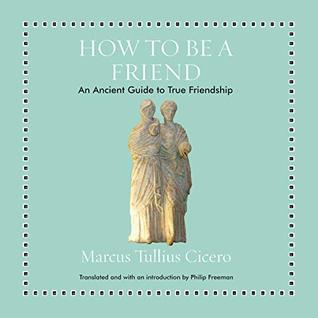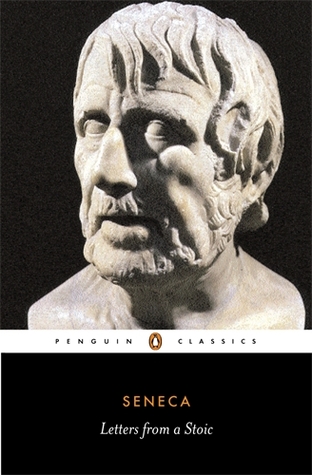
I’d placed a library hold for Cicero’s How to Be a Friend months ago, when I joined Cleo’s dual readalong for that book and The Art of Loving. The slow wait turned out for the best, since its availability coincided with my current reading of Seneca’s Letters from a Stoic, which covers some of the same topics.

As for Seneca, he’d been sitting on my shelf for ages. I started reading him during a sad mood because he was the only thing around that didn’t feel unbearably detached from what I was going through: disillusionment with an old “friend” and fear of losing a new one. I don’t know if it’s Seneca himself or the translator Robin Campbell who’s more to be credited, but Letters really does feel like listening to a kindly mentor who manages to impart wisdom in an approachable way (his sense of humor helps). I’m only about 1/4th through but enjoying it very much.
This will not be a terribly in-depth review—will probably save that for a podcast episode—but I wanted to muse over a few things that jumped out at me.
Amicitia, Redefined
Seneca the Younger (born ca. 4 BC) was a contemporary of Jesus, while Marcus Tullius Cicero was born in 106 BC. It seems possible Seneca was influenced by Cicero, who had been a prestigious Roman orator. Either way, they both viewed friendship or amicitia in a more serious light than either we or their contemporaries did.
To get an idea of how amiticia was popularly perceived back in the day, check out the first preview-page here of a 1965 article from the Cambridge Philosophical Society. In short, “friends” were essentially considered to be just allies, political or social, who could help you be successful in life, as long as you were willing and/or able to return the favor.
This is not unlike what society often considers friendship to mean today, especially in the context of social media where mere quantity and support (in the form of likes and comments) can be misused as a kind of friendship currency. There is no particular sense of commitment and, in some cases, even closeness. If anything goes awry, we can ignore, hide, or even block that person as if they don’t exist anymore.
By contrast, Seneca explains his perception of friendship strongly and succinctly in his 9th letter:
What is my object in making a friend? To have someone to be able to die for, someone I may follow into exile, someone for whose life I may put myself up as security and pay the price as well. The thing you describe is not friendship but a business deal, looking to the likely consequences, with advantage as its goal . . . How then can the nobler stimulus of friendship be associated with any ignoble desire?
Seneca, Letter IX
This brought immediately to mind the famous verse, spoken by Jesus: “Greater love has no one than this, than to lay down one’s life for his friends.” What I never thought about before—and which reading Seneca prompted in me—was the very implication that a friend, by definition, would be someone to die for. How many people that we call friends would we willingly, happily give up our lives for?
No more so than in the present era, the term “friend” is used so flippantly. I can’t even think of a word to represent the relationship Seneca describes. That’s pretty sad.
How Do We Choose Friends?
How to Be a Friend is written in the form of an elder, Laelius, imparting wisdom to two young men. Laelius has recently lost his dear friend, Scipio Africanus, and his listeners wish to learn about friendship and also how Laelius is handling the loss.
The underlying premise is that a friend is someone you choose, not someone you find. In fact—consistent with the devotion and sacrifice you will put into the relationship—a friend is someone you should choose very carefully (more carefully than many people choose their significant others!).
There were many great pieces of advice here. I will just share a sampling:
- Friendship is an impulse of love, so take care not to love too quickly. Cicero recommends waiting till adulthood to form long-lasting friendships, because at that point, you have (hopefully) established some degree of stability in your own life and views.
- Virtue must be the basis for friendship. “Real friendship cannot be the child of poverty and need,” and if, at core, you’re simply looking to get something out of the person (or vice-versa) the friendship cannot be virtuous or sincere. This can occur, Cicero warns, when one person wants to take the relationship in a romantic or sexual direction, seeing the friendship as only a means to that end.
- In relation to the previous point: “Never ask a friend to do anything shameful, and don’t do anything shameful if asked.”
- A friend is “someone you can talk to about everything as if you were speaking to yourself.” Choose one who is honest and sympathetic, doesn’t value rank or money over your relationship, has the same values and interests, won’t spread rumors about you, and isn’t a mere flatterer.
- “Love after you have judged” rather than “judge after you have loved.”
If you can manage to make a true friendship, that friend will be with you even when they are not present (or even dead). This comforts Laelius in his mourning.
A Place for Hope
There is a lot of truth in both of these writings, and they left me somewhat encouraged. I do feel there is a missing element: the “rainy day” scenario, when a dear friendship seems threatened or already lost. For that, I would just add a quote from the Christian philosopher Kierkegaard:
…he who was your friend, it is still possible that he can again become your friend; it is possible that he who was sunk the deepest, alas, because he stood so high, it is still possible that he can be raised up again; it is still possible that the love which has turned cold can burn again – therefore never give up any man, not even at the last moment; do not despair. No, hope all things!
Søren Kierkegaard, Works of Love (1847)

Leave a comment